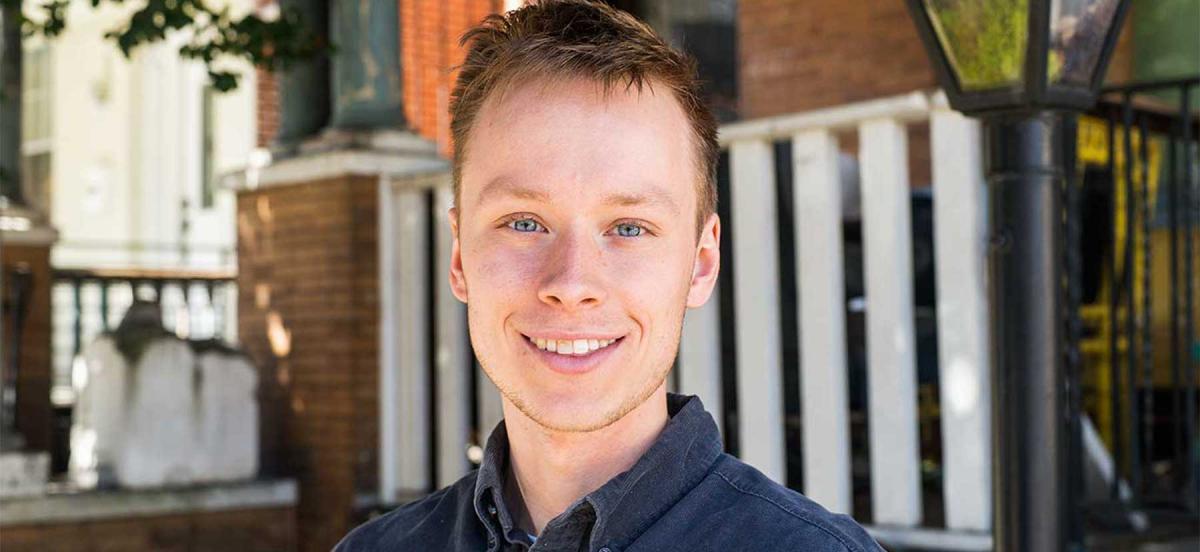Charles Hale '17 Wins Fulbright Student Research Award

Charles Hale '17 standing in front of Haverford House. Photo by Patrick Montero.
Details
The former biology major and current Haverford House fellow is headed to the Czech Republic to continue studying an invasive plant that was the focus of his senior thesis research.
What do you do when you're finished with your senior thesis, but your senior thesis isn't finished with you? If you're Charles Hale '17, you continue your research independently and then apply for a Fulbright U.S. Student Research Award to further it in the lab of one of the world's premiere experts on your subject.
The biology major first became interested in the common reed Phragmites australis working in the lab of Assistant Professor of Biology Jonathan Wilson. For his thesis, he focused on the microbiome of that invasive species' leaves.
"Just like how the bacteria in your gut are critical for good health, plants depend on bacteria that live on their roots, inside their stems, and on the surface of their leaves," says Hale. "I focused on the leaves for my thesis, which no one had done before. I sampled Phragmites leaves throughout the northeast and then scraped the leaf surface for bacteria before using next-generation [genetic] sequencing to reveal every species of bacteria that was on each leaf. Each leaf carries hundreds of species!"
After immersing himself in that work over his senior year, he wasn't ready to be done with it after his thesis was handed in and his graduation cap was thrown in the air. So after "braving the summertime ticks" to continue to gather samples to generate more data, he reached out to one of the world's premier Phragmites researchers, Petr Pyšek, to see if and how his thesis project could fit in with the work Pyšek was conducting in his lab in the Czech Republic. Thanks to earning a Fulbright U.S. Student Award—which will cover his round-trip airfare, health insurance, and living expenses in Prague for nine months—Hale will be working in that lab at the Czech Academy of Sciences' Institute of Botany starting in mid-September.
"I graduated from Haverford with enthusiasm and momentum behind the project, and I was eager to reach out to Professor Pyšek and his colleagues—several of whom I cited in my thesis—about potentially collaborating via the Fulbright," says Hale, one of only five Fulbrighters chosen for Student Research Awards in the Czech Republic. "There's an international network of researchers who are collaborating on Phragmites research, and I'm very excited to be involved in that."
Since his College graduation, Hale hasn't only been focused on leaves. He was one of six members of the Class of 2017 selected for a Haverford House Fellowship. That program, run by the Center for Peace and Global Citizenship, chooses graduating seniors committed to social justice and community action for a post-graduate year of work at Philadelphia-area nonprofits, during which the fellows share a West Philadelphia home and create projects that engage the College with local groups devoted to creating a more just, healthy, and vibrant community. As part of his fellowship, Hale has been working with University City Science Center FirstHand, which runs STEAM (science, technology, engineering, art, and math) programming in Philadelphia middle and high schools.
"It's been incredibly fun work, and it's made me a much better communicator of science, which is so important," he says. "I'm hoping to get re-involved in education in some capacity while I'm in Prague, perhaps by doing volunteer environmental education. But first I've got to learn some Czech."
His upcoming year in Prague won't be the first time that Hale has traveled for an educational experience. During his time at Haverford, he conducted research one summer in Germany as a KINSC Summer Scholar, went to the Arizona/Mexico border for the CPGC's Borderlands trip, and was a part of the inaugural "Economic Botany" study tour of Trinidad and Tobago. After he returns from Prague, Hale hopes to pursue graduate work in biostatistics, but he is also eager to fuse his scientific endeavors with all of the social justice work he has done during his Haverford House year.
"My Fulbright project will give me lots of practice working with large genomic datasets, in addition to plenty of field and wet lab work," he says. "Nothing awes me as much as the complexity of the natural world, but this year at Haverford House has strengthened my interest in so many other things as well: education, immigration policy, environmental justice and city planning, criminal justice reform. I want to keep thinking deeply about biological questions while also having the statistical chops to work on data-driven projects in other fields."
Read more about Fords who have won fellowships, scholarships, or grants.



